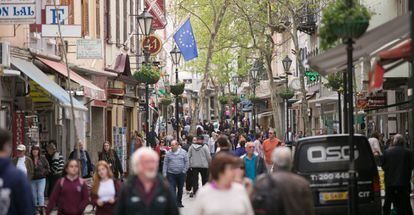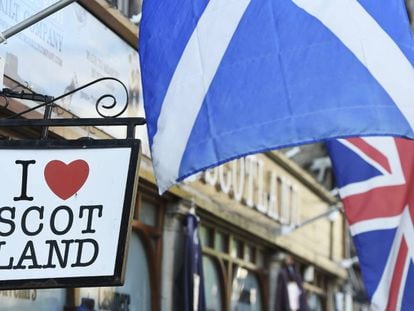Stoic Gibraltar slowly comes to terms with life after Brexit
The British Overseas Territory is largely optimistic about its future outside the EU

After the initial denial, anger, failed negotiations and depression in the wake of the United Kingdom’s Brexit vote, Gibraltarians, 95% of whom voted to remain in the European Union, now seem to have accepted their fate and are largely optimistic about the future.

This may have something to do with their recent history: accustomed to decades of a closed border with Spain that separated families, and to periodic lengthy lines and blockades at the border crossing, as well as repeated diplomatic rows and the rampant nationalism of both sides, the Brexit that will take place in 2019 is just another challenge – one which 70-year-old Mary López accepts.
We’ll have to do the best we can with the cards we’ve been dealt James Tipping, Gibraltar Finance
“I was born in the north of Ireland because my father was there when the Second World War broke out. Then I saw 13 years of a closed border between Spain and Gibraltar and we tried to live as best we could. Now, we’ll get over this. We’re optimists because we’re used to it,” she says proudly.
There’s also a mood of quiet optimism in Gibraltar’s business community, with a feeling that there will be life after Brexit. James Tipping, the head of Gibraltar Finance, says that following the UK vote, the government looked into whether the Rock’s financial services sector, on which the economy depends in large part, would be able to survive. “It discovered that 90% of Gibraltar’s financial business is with the United Kingdom,” says Tipping.
“We are where we are, and we’re going to have to do the best we can with the cards we’ve been dealt,” he says. The next step has been to take measures to hold on to what has been achieved under the EU umbrella. Unlike the UK’s other 13 Overseas Territories, Gibraltar has unfettered access to the UK, its biggest market, and the EU.
“We have a commitment from the British government that the relationship between the United Kingdom and Gibraltar will be maintained on the same terms,” says Christian Hernández, head of the Gibraltar Chamber of Commerce, which brings together some 400 companies with around 9,000 employees. “The question is how the City will hold up after Brexit,” says Hernández, referring to the London’s financial services sector.
He says that following the Brexit vote “things were painted blacker than they really were: here at the Chamber, we have always said that Gibraltar is a small, flexible and diversified economy,” referring to sectors such as financial services, online gaming, insurance and “bunkering” – the sale of fuel from vessels in the Strait of Gibraltar.
A report commissioned in 2015 by the Chamber of Commerce shows that 25% of GDP in the Spanish-controlled Campo de Gibraltar area next to the Rock is generated by Gibraltar, which provides employment to almost 7,000 Spaniards. “It is the second-largest employer in Andalusia after the regional government. Furthermore, Gibraltarians spend money in Spain, we have second homes or businesses in the region,” adds Hernández, warning that all this could be in danger if the border control system with Spain is changed.
For most Gibraltarians, the Brexit that will take place in 2019 is just another challenge
“In practice, with the Gibraltar border, it is as though you were already outside Europe. It is outside Schengen and we have a customs control point,” he says. But few believe the crossing with Spain will be closed following Brexit.
Nevertheless, people on both sides are worried about the impact of Spain imposing stricter controls at the crossing. A minor diplomatic incident three years ago produced lengthy delays.
“If there are restrictions on the movement of people and goods, then sales in Gibraltar will fall and there will be too many Spaniards and not enough jobs,” says Paco Villalta, one of the 250 employees at Anglo-Hispano, a catering and restaurant company based in Gibraltar.
John Isola runs Anglo-Hispano. The company’s trucks, laden with tobacco, alcohol and food, are part of the 300 or so that cross the border with Spain every day. He’s optimistic, but has his doubts: “As a businessman you think things over for longer now. The uncertainty is the worst in all this.” He adds that over the last year he has noticed an increase in checks at the border.
“Goods are checked by a system that goes from green to red, depending on tax. Before, 100% of green-level goods went through without problem. Now they are opening up to 70% of them, even though they are sealed and in transit from the United Kingdom. There is no need, and we think it is being done to cause problems,” says Isola, who fears that greater scrutiny will be applied in the coming months.
In the meantime, after rejection of Spain’s offer of co-sovereignty by the Gibraltar government, he says that the only way to keep going is to deal with each day as it comes, leaving aside the diplomatic spats: “Questions about sovereignty are way over the heads of ordinary people.”
English version by Nick Lyne.












































